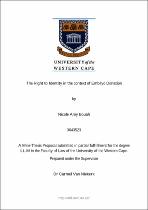| dc.description.abstract | In this research, I seek to investigate the extent to which the South African Legislature and the international community recognises the right to identity of a child born through embryo donation.
First, I carefully examine the multiple aspects which the right to identity comprises namely: personal, biological, family and siblingship identity. Thereafter, I examine how these various aspects are impacted by national and cross-border embryo donation arrangements.
Second, I explore the implications of recognising the child’s right to identity on other parties involved in the embryo donation process, specifically the donor and recipient couples’ rights to privacy and private family life. In addition, I briefly consider the impact of the abolition of donor anonymity on the number of available embryos and reduction of profits on stakeholders in the fertility industry. | en_US |

